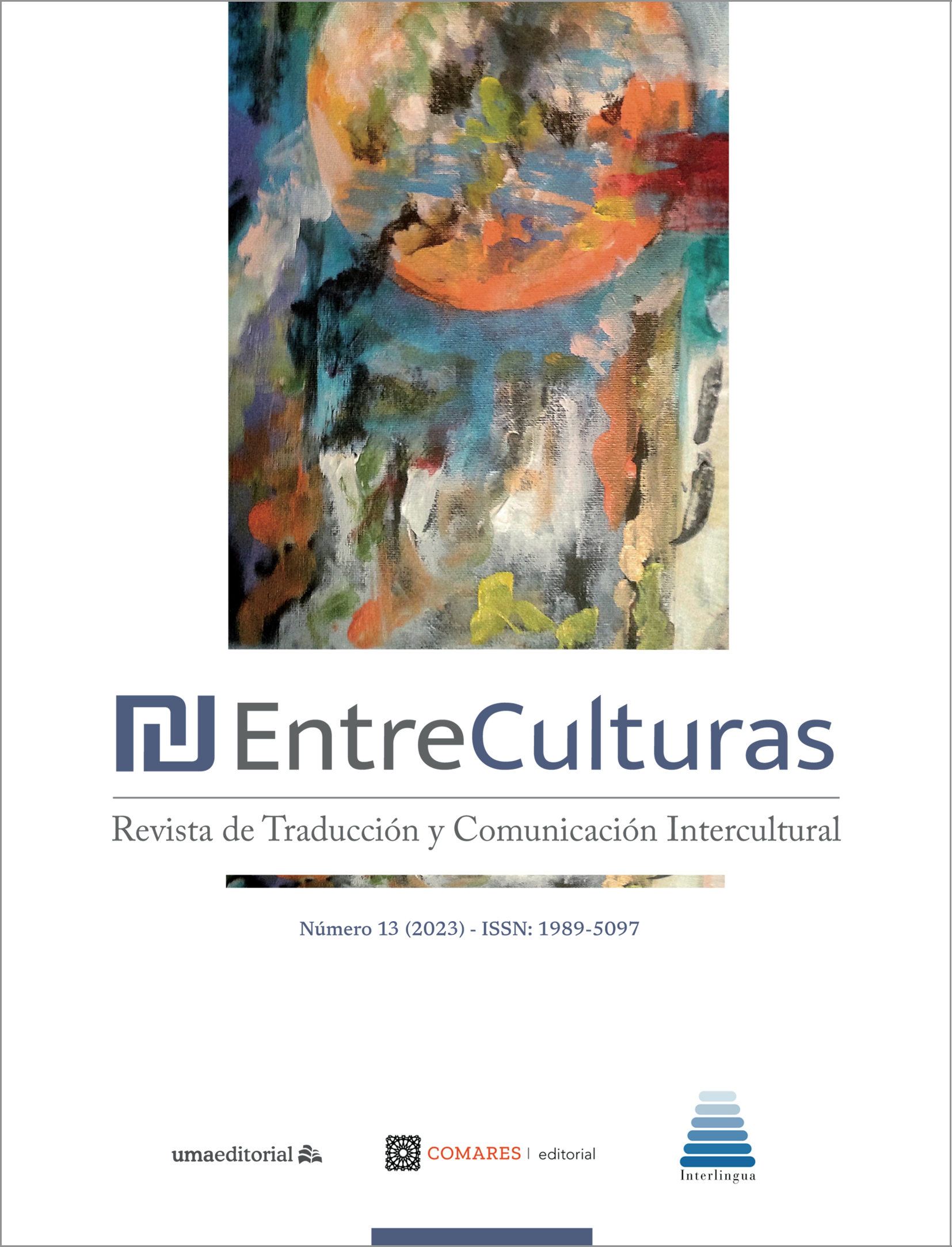Análisis de la imagen y proyección del enoturismo español en Francia a través de la traducción de páginas web comerciales e institucionales
DOI:
https://doi.org/10.24310/Entreculturasertci.v13i13.13831Palabras clave:
enoturismo, Francia, páginas web, vino, traducciónResumen
Este trabajo tiene como objetivo examinar el potencial del enoturismo en Francia, principal país importador de vino español y uno de los focos de procedencia más importantes de turismo en España. Para ello, se ha analizado la proyección del enoturismo español en Francia a través de la búsqueda de páginas web comerciales e institucionales de España. Se ha tenido en cuenta no solo la visibilidad y posicionamiento, sino sobre todo el acceso a contenido traducido al francés. Asimismo, se han observado las estrategias de promoción del enoturismo y la adecuación de las traducciones. Sin embargo, los resultados muestran que se requiere aún una mayor concienciación sobre la importancia de la traducción para poder aprovechar el potencial del enoturismo en otros países y, en concreto, en Francia.
Descargas
Métricas
Citas
Asociación Española de Ciudades del Vino – ACEVIN (s. f.). El impacto económico del enoturismo en las Rutas del Vino de España supera los 85 millones de euros solo en visitas a bodegas y museos. https://www.acevin.es/el-impacto-economico-del-enoturismo-en-las-rutas-del-vino-de-espana-supera-los-85-millones-de-euros-solo-en-visitas-a-bodegas-y-museos.
Barroso, Charo (2020, 30 de enero). España siembra su futuro como potencia enoturística. ABC Economía. https://www.abc.es/economia/abci-espana-siembra-futuro-como-potencia-enoturistica-202001300203_noticia.html.
Bellaaziz, Ayoub (2020). Resumen ejecutivo. Estudio de mercado: El mercado del vino en Francia, 2020. Oficina Económica y Comercial de España en París (ICEX España Exportación e Inversiones). https://www.icex.es/icex/es/navegacion-principal/todos-nuestros-servicios/informacion-de-mercados/paises/navegacion-principal/el-mercado/estudios-informes/DOC2019819385.html?idPais=FR
Calvi, Maria Vittoria (2010). Los géneros discursivos en la lengua del turismo: una propuesta de clasificación. Ibérica, 19, 9-32.
Cruz Trainor, M.ª Magdalena de la (2003). La traducción de textos turísticos: propuesta de clasificación y análisis de muestras [Tesis doctoral]. Universidad de Málaga.
Durán Muñoz, Isabel (2008). La traducción turística y la evaluación de su calidad. En: Purificación Sánchez Hernández (ed.). Researching and teaching specialized languages: new contexts, new challenges [recurso electrónico]. Universidad de Murcia.
Durán Muñoz, Isabel (2014). Aspectos pragmático-lingüísticos del discurso del turismo de aventura: estudio de un caso. Normas: revista de estudios lingüísticos hispánicos, 4, 49-69.
Federación Española del Vino (2022). El sector del vino en cifras. http://www.fev.es/sector-cifras/.
García Ropero, Javier (2019, 12 de abril). El vino español fue el más exportado del mundo en 2018… pero con el precio más barato. Cinco Días: El País Economía. https://cincodias.elpais.com/cincodias/2019/04/11/companias/1555003087_432849.html.
González García, Virginia (2012). El discurso del turismo en internet: hacia una caracterización de sus géneros. En Julia Sanmartín Sáez (ed.), Discurso turístico e internet (pp. 13-49). Iberoamericana.
Kelly, Dorothy (1997). The translation of texts from the tourist sector: textual conventions, cultural distance and other constraints. TRANS, 2, 33-42.
Kelly, Dorothy (2005). «Lest Periko Ortega give you a sweet ride…» o la urgente necesidad de profesionalizar la traducción en el sector turístico. Algunas propuestas para programas de formación. En Adrián Fuentes Luque (ed.), La traducción en el sector turístico (pp. 155-170). Atrio.
Ibáñez Rodríguez, Miguel (coord.) (2010). Vino, lengua y traducción. Secretariado de Publicaciones e Intercambio Científico de la Universidad de Valladolid.
Ibáñez Rodríguez, Miguel (coord.) (2020). Enotradulengua: vino, lengua y traducción. Peter Lang.
Instituto Nacional de Estadística (2021). Cuenta Satélite del Turismo en España (CSTE). Revisión Estadística 2019. Serie 2016-2019. https://www.ine.es/prensa/cst_2019.pdf.
Le Poder, Marie-Evelyne y Fuentes Luque, Adrián (2005). El turismo en España: panorama introductorio. En Adrián Fuentes Luque (ed.), La traducción en el sector turístico (pp. 117-134). Atrio.
Mondéjar Jiménez, Juan Antonio, Vargas Vargas, Manuel, Cordente Rodríguez, María y Carricano, Manu (2013). Nuevos productos turísticos: estrategias de enoturismo en Castilla-La Mancha. En Guido Ferrari, José Mondéjar Jiménez, Juan Antonio Mondéjar Jiménez y Manuel Vargas Vargas (coord.), Principales tendencias de investigación en turismo (pp. 117-134). Septem Ediciones.
Ramírez Almansa, Isidoro (2020). Terminología y traducción en contextos especializados (alemán-español): Vitivinicultura [Tesis doctoral]. Universidad de Córdoba.
Ramírez Almansa, Isidoro (2021). El mundo del vino: textos, terminología y traducción (alemán-español). Comares.
Sánchez Nieto, María Teresa (coord.) (2006). El lenguaje de la vid y el vino y su traducción. Secretariado de Publicaciones e Intercambio Editorial de la Universidad de Valladolid.
Serna, Víctor de la (2020, 16 de enero). La maldición del vino español: los extranjeros aún lo ven ‘de supermercado’. El Mundo. https://www.elmundo.es/papel/gastro/2020/01/16/5e1f3a6ffc6c831b098b46c8.html.
Suau Jiménez, Francisca (2012). El turista 2.0 como receptor de la promoción turística: estrategias lingüísticas e importancia de su estudio. Pasos: Revista de Turismo y Patrimonio Cultural, 10 (4), 143-153.
Turespaña (2021). Indicadores turísticos: Francia. Ministerio de Industria, Comercio y Turismo. https://www.tourspain.es/es-es/ConocimientoTuristico/FichasEjecutivas/Ficha%20ejecutiva%20Francia%20Febrero%202021.pdf
Valero, Marina (2019, 10 de junio). El enoturismo se dispara un 168% en una década pero aún no seduce a los extranjeros. El Confidencial. https://www.elconfidencial.com/economia/2019-06-10/enoturismo-hosteleria-bodegas-vino_2065418/.
Publicado
Cómo citar
Número
Sección
Licencia
Todos los contenidos publicados en Entreculturas. Revista de traducción y comunicación intercultural están sujetos a la licencia Creative Commons Reconocimento-NoComercia-Compartirigual 4.0 cuyo texto completo puede consultar en <http://creativecommons.org/licenses/by-nc-sa/4.0>
- Se pueden copiar, usar, difundir, transmitir y exponer públicamente, siempre que:
- Se cite la autoría y la fuente original de su publicación (revista, editorial y URL de la obra).
- No se usen para fines comerciales.
- Se mencione la existencia y especificaciones de esta licencia de uso.
Los derechos de autor son de dos clases: morales y patrimoniales. Los derechos morales son prerrogativas perpetuas, irrenunciables, intransferibles, inalienables, inembargables e imprescriptibles. De acuerdo con la legislación de derechos de autor, Entreculturas. Revista de traducción y comunicación intercultural reconoce y respeta el derecho moral de los autores/as, así como la titularidad del derecho patrimonial, el cual será cedido a la Universidad de Málaga para su difusión en acceso abierto. Los derechos patrimoniales, se refieren a los beneficios que se obtienen por el uso o divulgación de las obras. Entreculturas. Revista de traducción y comunicación se publica en open access y queda autorizada en exclusiva para realizar u autorizar por cualquier medio el uso, distribución, divulgación, reproducción, adaptación, traducción o transformación de la obra.
Es responsabilidad de los autores/as obtener los permisos necesarios de las imágenes que están sujetas a derechos de autor.





7.png)
